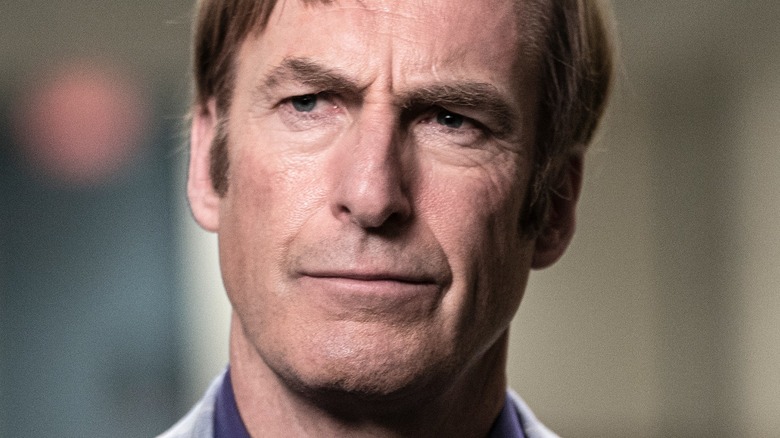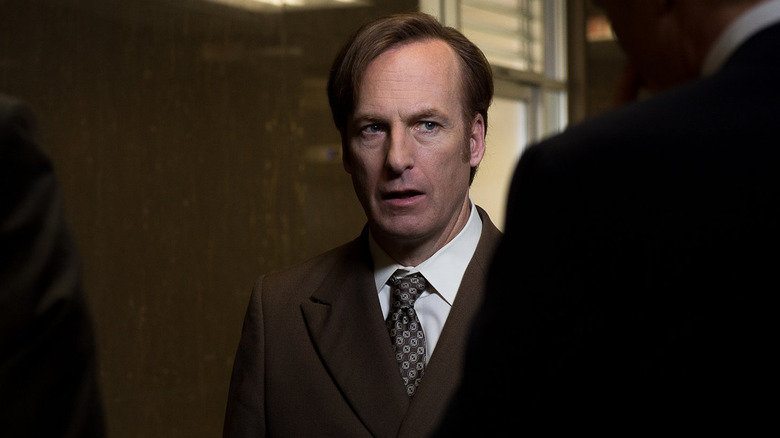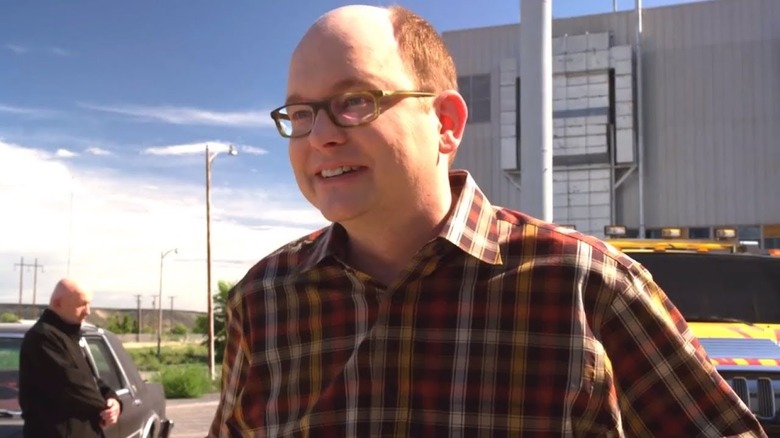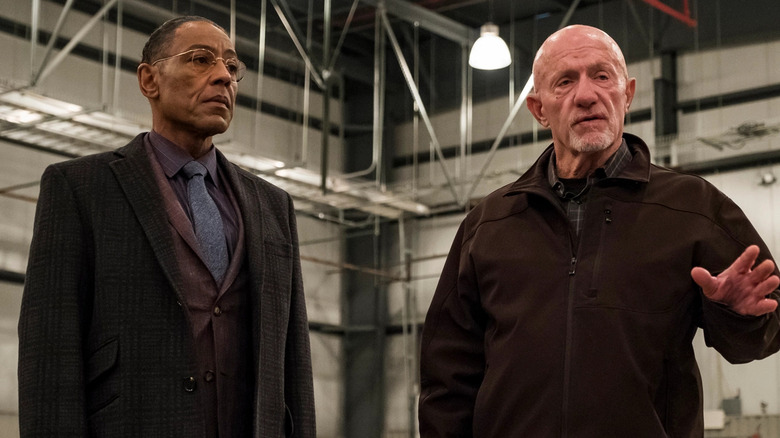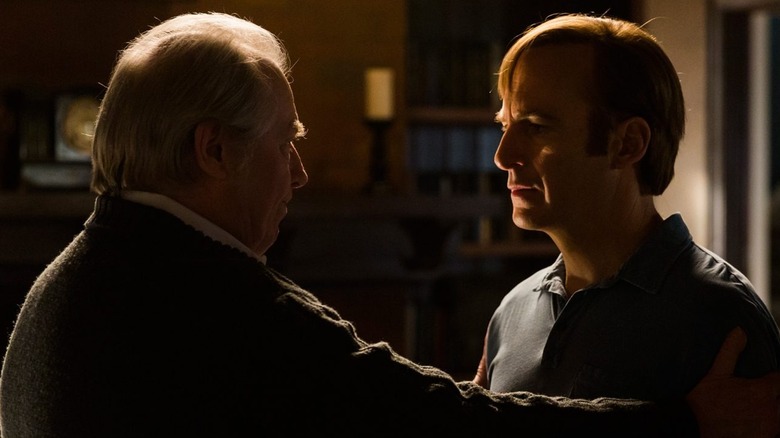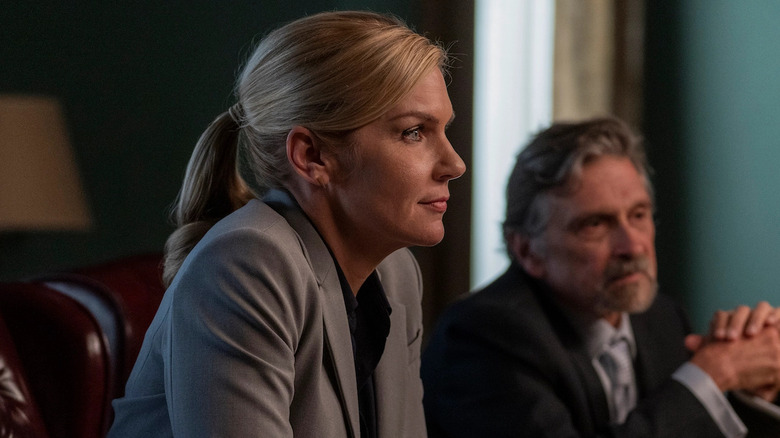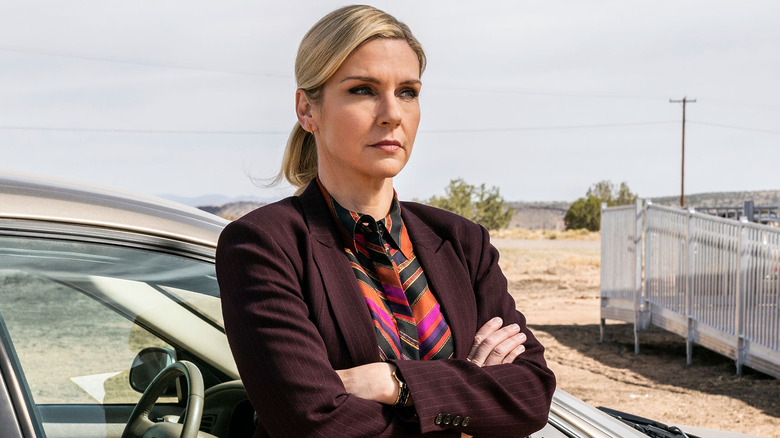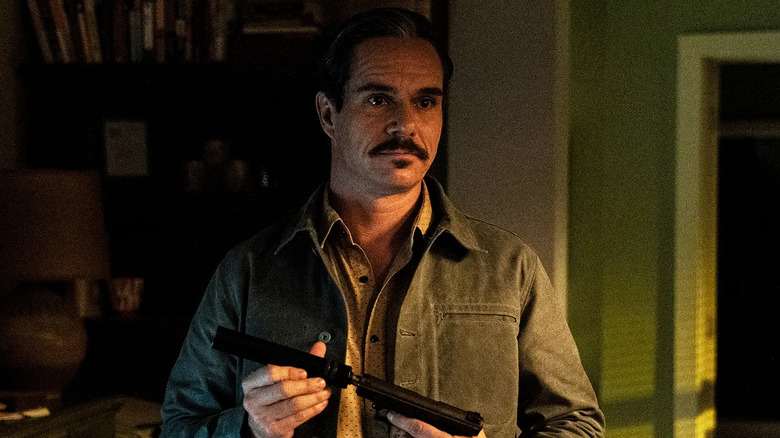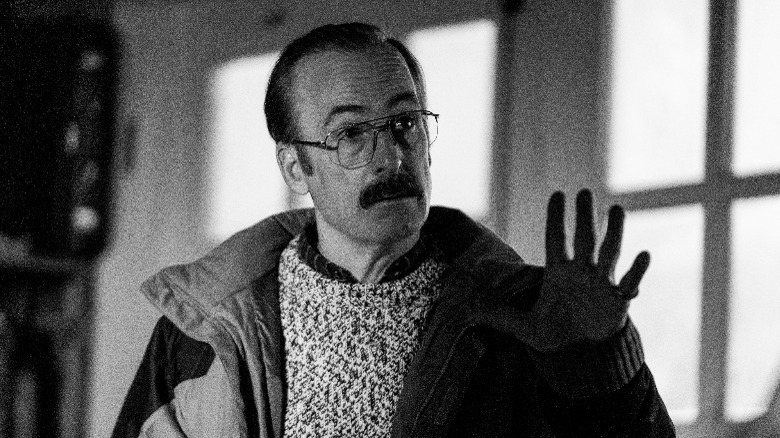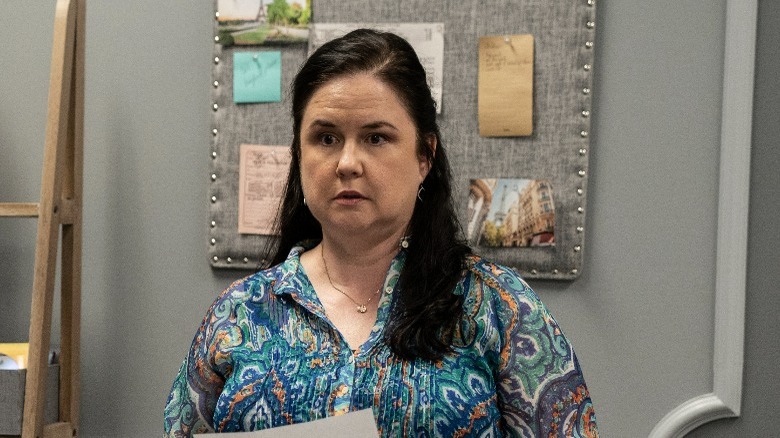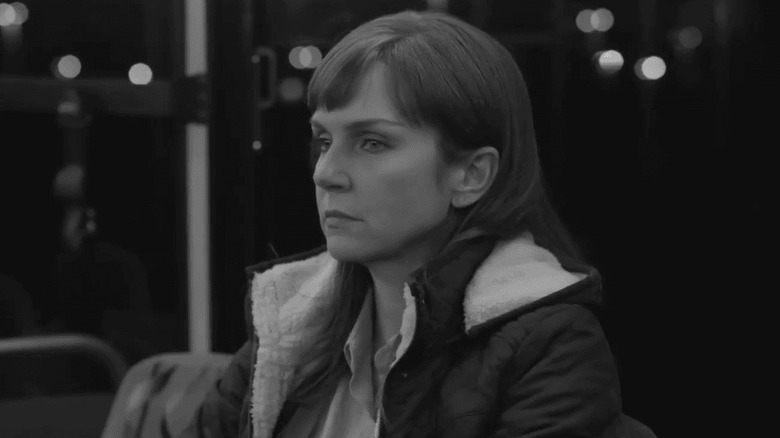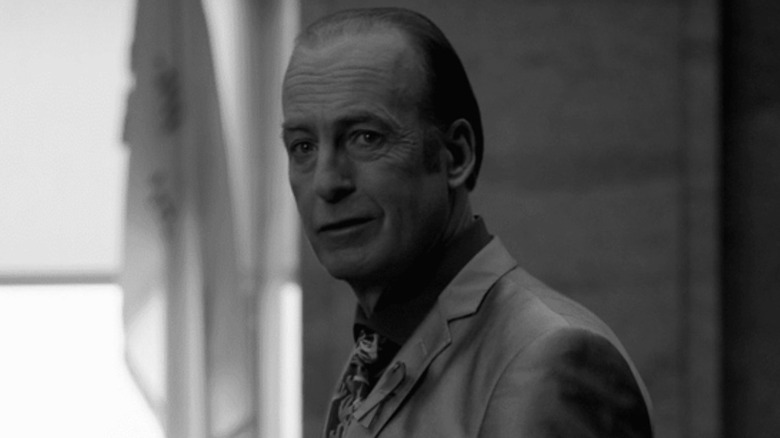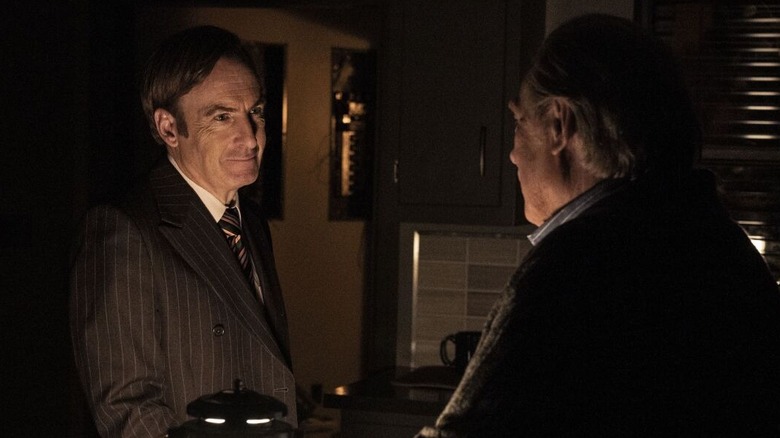Confusing Moments In Better Call Saul Explained
"Better Call Saul" has officially concluded its seven-year run, and the Season 6 finale "Saul Gone" ends with Jimmy McGill facing 86 years in federal prison. Throughout its run, "Better Call Saul" has earned praise from critics, such as those at GQ, who have called it a much more intricate, detailed series than its predecessor, "Breaking Bad." Whereas "Breaking Bad" involved high-stakes action, criminal confrontations, and drug manufacturing, "Better Call Saul" thrived on legal procedures, con jobs, and the relatively mundane lives of its central characters.
As a result, many viewers are likely walking away from "Better Call Saul" with some unanswered questions about some of the show's most significant plot points. Often, the decisions made by characters in "Better Call Saul" are not spelled out plainly for the audience at home, but that doesn't mean their motives are baseless or without reason. This is further exemplified by the exceptional use of visual storytelling in "Better Call Saul," which often replaces dialogue or action showing a story movement with imagery, symbolism, and long, dialogue-free sequences.
Here are some of the most confusing events from the series that may inspire questions from viewers even after "Better Call Saul" rounded the bases in Season 6. Some characters' fates are up in the air, while other momentous decisions in the show may draw confusion from invested viewers. Worry not, however, as the writers of "Better Call Saul" have thought of everything — even if it might not be clear as day.
Why does Jimmy take the job at Davis & Main?
The end of Season 1 seems to suggest that Jimmy McGill's path to darkness would be quick. He's offered a job by the law firm Davis & Main, thanks to a recommendation by Kim Wexler. However, Jimmy drives away from the meeting determined to chase success, even if that means not doing "the right thing." When Season 2 begins, the decision becomes much more complicated after Jimmy asks Kim if his taking the job will affect their chances of getting together.
When Kim finds him later, he's lounging in a hotel pool, drinking during the day. Kim can't see his reasoning behind turning down Davis & Main, but Jimmy's focus is on a familiar "Breaking Bad" character, Ken, who obnoxiously talks on his Bluetooth phone at the bar. Jimmy coerces Kim into scamming Ken into paying for a bottle of Zafiro Añejo tequila. Thrilled by the experience, Kim kisses Jimmy, and they spend the night together.
Kim returns to her job while Jimmy looks for targets to scam. However, he finds the hotel a much lonelier experience without Kim and calls Davis & Main to accept their offer. Some viewers may question what makes Jimmy change his mind, but the answer lies in him flicking a switch with a warning label that reads "Always Leave On! Never Turn Off!" in his new Davis & Main office: maybe he can be himself and make Kim happy at the same time.
What happened to Pryce?
Daniel Wormald, aka Pryce, is a recurring character in the early seasons of "Better Call Saul." Pryce arranges to sell pills from his pharmaceutical company to Nacho and hires Mike to be his bodyguard. His naivete quickly gets him in hot water, as he uses his drug money to buy a flashy Hummer, which leaves him susceptible to Nacho burglarizing his house. When he notices his prized baseball cards missing, Daniel stupidly contacts the police, who catch on to his potential criminal affairs while searching his house.
This results in Jimmy getting involved, defending Daniel to the police by fabricating a story about the rookie criminal filming fetish videos in one of the series' best moments. This marks the end of Daniel's criminal ventures, but he reappears in Season 3 to sell Nacho empty capsules for his plan to switch Hector's heart pills. Sadly, this is the last time the audience gets to see Daniel in "Better Call Saul," as the character doesn't appear in Seasons 4, 5, or 6.
However, Season 6 clears up Daniel's role in the life of Saul Goodman. During Gene's call with Francesca, he mentions Danny, an unseen character in "Breaking Bad" who runs a laser tag business that Saul tries to launder Walt's money through. "Better Call Saul" writer-producer Thomas Schnauz confirmed that "Danny" and Daniel are the same in an interview with Rolling Stone.
Why does Mike choose to work for Gus?
Season 3 features the highly-anticipated return of Gus Fring, Walt's biggest adversary in "Breaking Bad." Gus plays an integral role in Mike's story as the career criminal takes a job with the future meth kingpin. Their initial meeting in Season 3 isn't on the best of terms, as Gus interferes with Mike's attempt to kill Hector Salamanca. However, they join forces, with Mike sabotaging Hector's drug supply by covering one of his delivery trucks with cocaine, alerting the police.
When Gus tries to pay Mike for his help, Mike refuses. Despite this, Gus invites Mike to work for him in the future, which Mike also turns down. For the ex-cop, being a part of the criminal world is something he clearly doesn't want. In the Season 6 finale, Mike even says that if he had a time machine he would stop himself from taking his first bribe in the hopes that it would deter him from the path his life has taken.
Still, many fans scratched their head when Mike decided to work for Gus at the end of Season 3. As Mike explains in that scene, he needs to launder the money he stole from Hector so that he can leave it behind for his family. It may seem like a big leap for Mike to go all in with Gus in "Breaking Bad," but that's because Gus' operation is the only thing securing his family's future.
Does Jimmy really not care about Chuck?
Jimmy always had a tumultuous relationship with his older brother, Chuck. Things take a turn for the worse in Season 3 when their conflict results in a climactic courtroom incident where Chuck lashes out at his brother for scamming people. Suffice it to say, there's quite a bit of love lost between the two, as Jimmy takes his anger out on Chuck by getting his malpractice insurance canceled. Despite Jimmy's attempts to reconcile the relationship, Chuck coldly tells Jimmy that he never mattered to him.
Shortly after this hurtful exchange, Chuck's electromagnetic hypersensitivity relapses, and he dies after knocking over a lamp and setting his house on fire. Season 4 finds Jimmy dealing with the grief — or rather not dealing with it by quickly moving on. This coldness from Jimmy results in him not getting his law license reinstated for seeming insincere, which Kim deduces to mean he didn't talk about Chuck. When Jimmy finally gets emotional about his brother in front of the ba association, Kim is disheartened to find it's all a ruse.
Nevertheless, the question remains: does Jimmy truly care about Chuck? The obvious answer would be of course, and that Jimmy's lack of empathy towards him is a matter of him lashing out in anger toward his brother. The Season 6 finale puts all questions to rest as Jimmy expresses sincere guilt over his actions leading to Chuck's death — something he may never forgive himself for.
Why does Kim want to con Mesa Verde?
In Season 2 of "Better Call Saul," Kim Wexler hustles to get Mesa Verde Bank and Trust as a client for Hamlin, Hamlin & McGill. When she leaves the firm to start her own practice, she ends up taking Mesa Verde with her, thanks to Jimmy's sabotage of Chuck's documents. For most of the series, they remain her most important client while also being a source of stress and tension for Kim. Sooner or later, though, her allegiance to Mesa Verde starts to waiver, which lines up with her increased desire to join Jimmy in cons.
While the first cons she pulls help Mesa Verde obtain a larger branch, her later ones are more nefarious towards her employer. In Season 5, she becomes frustrated with Kevin's attempts to evict Everett Acker, a homeowner whose property is where Mesa Verde wants to build their call center. Despite Kim's attempts to dissuade Kevin from pursuing Acker's land, Kevin pushes forward, giving Kim no choice but to play by Jimmy's rules.
Kim convinces Jimmy to represent Acker, utilizing various distractions to delay the destruction of Acker's home. This eventually results in a settlement negotiation where Jimmy goes far beyond Kim's initial plans, angering Kevin and making her look like they weren't in cahoots (which was Jimmy's plan). It's a lot of scamming for the sake of Kim feeling empathy for a man protecting his home after she admits she never had one.
Is Kim a bad person?
The end of Season 5 marks a significant shift in Kim Wexler's character arc, as she finally breaks bad and suggests that she and Jimmy tear down Howard Hamlin's reputation as a way to force a settlement in the Sandpiper lawsuit. Though Jimmy is initially hesitant, Kim charges full steam ahead with their plan to frame Howard as a coke addict. Some viewers may see this as a pretty divisive turn in Kim's story, as she used to be the angel on Jimmy's shoulder driving him to do good. However, things are not always as they seem.
As early as Season 2, it's been clear that Kim is thrilled by the art of the con. She justifies her scams as being for the greater good, but her criminal background has much deeper roots. A flashback in Season 6 shows Kim as a teenager shoplifting a pair of earrings, and she manages to get away with it thanks to her mother. Viewers may question whether Jimmy is the one who changed Kim, or if she always had an inner Saul Goodman hiding beneath a closed-off exterior, as observed by ScreenRant.
Still, Kim may not be a doomed person, given how the ending of Season 6 plays out. She recognizes her role in the disastrous events to come and spends the rest of her life making amends. Maybe there's hope for Kim after all — just as there may be hope for Jimmy.
Why does Lalo visit Jimmy and Kim?
In the Season 6 episode "Plan and Execution," Jimmy and Kim's scheme against Howard succeeds. Howard humiliates himself in front of the Sandpiper lawyers, forcing a settlement, all the while raving about how Jimmy is behind this. Later, he confronts Jimmy and Kim in their apartment, condemning them for being soulless. Unfortunately, this is also when the lawyers are visited by none other than Lalo Salamanca. With his signature smile, Lalo shoots Howard before telling Jimmy and Kim that he wants to talk.
This scene was perhaps the greatest shock throughout all of "Better Call Saul" and maybe in the entire "Breaking Bad" universe. Still, it didn't stop some fans from wondering why — or how — Lalo showed up. The last time viewers saw Lalo in the episode, he was hiding in a sewer system underneath Albuquerque, awaiting his moment to strike Gus' superlab. When he discovers that Gus and his men know he's alive, he has to start thinking three steps ahead.
That's when he sees a cockroach in the sewers. Hardcore fans will remember Lalo's meeting with Kim in Season 5's "Bagman," where he eases her worries about Jimmy's disappearance by saying, "Your man, he's like the cucaracha, you know? Born survivor." This might be what gives him the idea to use Jimmy and Kim as distractions so that he can ambush Gus and his men at the laundromat.
How did Gene know Jeff wanted in the game?
Episode 10 of "Better Call Saul" Season 6 is the first episode to take place entirely in the timeline that comes after "Breaking Bad." In previous seasons, these scenes had been saved for the season openers, showing the slow-moving story of Saul as Gene Takovic, a mall Cinnabon manager in Omaha. Previously, Gene had been spotted in Omaha by a cab driver, Jeff, who recognizes him as Saul Goodman. Gene initially calls Ed — aka the Disappearer — to set up a new life, but the last time we see him before Season 6, he decides to figure it out on his own.
That brings audiences to the episode "Nippy," which finds Gene intimidating Jeff by becoming friendly with his mother, Marion, played by the incomparable Carol Burnett. When they get a moment alone, Gene confronts Jeff on what he really wants: to be in the game. Gene offers to let him in on a scam, in which Jeff will rob the mall while Gene distracts the security guards. Once Jeff makes it out with the payload, Gene tells them that this marks the end of their criminal careers.
Following this episode, many viewers were left wondering how Gene knew Jeff wanted in the game. The answer can be seen in the Season 5 opener when Jeff recognizes Saul. When Jeff coerces Gene to admit that he's Saul, he tells the lawyer that he was a big fan of his in Albuquerque.
What happened to Francesca?
"Breaking Bad" fans were delighted when Francesca finally entered "Better Call Saul" during Season 3 by becoming the receptionist for Jimmy and Kim's shared legal offices. Back then, it was humorous that the former DMV employee was so chipper and enthusiastic about working, given that in "Breaking Bad" she was often annoyed by Saul Goodman and seemingly drained of all life. Clearly, working with Saul Goodman eventually took a toll on Francesca.
She returns in Season 6 to work in Saul Goodman's office, but the audience never gets to see what makes her so dreary by the time "Breaking Bad" begins. A flashback to just before "Breaking Bad" sees her helping Jimmy and Kim sign their divorce documents, but at this point she's already used to the soullessness of Saul Goodman's behavior. However, the answer to Francesca's attitude may lie in a scene in the "Better Call Saul" Season 6 episode that happens to be titled "Breaking Bad."
Francesca appears in the episode when she answers a call from Gene in Omaha and updates him on the goings-on in Albuquerque. When it becomes clear that Francesca has no good news for Gene, she looks concerned when she offers up the information that Kim had recently called. We may never know what drove Francesca to the deep end, but it's clear that she always cared for Jimmy and Kim — but maybe not so much for Saul Goodman.
Why does Kim cry on the bus?
The penultimate episode of "Better Call Saul," titled "Waterworks," catches up with Kim after the "Breaking Bad" era. Following the murder of Howard, she moves to Florida, working at a sprinkler manufacturer and living a dull, indecisive life. That is, right up until she gets an unexpected call from Gene. She tries to convince him to turn himself in, and Gene tells her to do the same if she feels so guilty. Little does Gene expect that Kim does just that. She flies to Albuquerque and signs a sworn affidavit recounting the events of Howard's murder.
As she returns to the airport and boards a shuttle bus, Kim breaks down in tears in an Emmy-worthy performance from Rhea Seehorn. Though she tries to resist, she's eventually loudly sobbing in public. While the scene is emotionally poignant, some fans were curious as to what exactly what causing Kim to cry so much. Some believed it was the guilt of Howard's murder, while others thought it was about her uncomfortable conversation with Howard's widow, Cheryl.
In an interview with Variety, Rhea Seehorn and writer-director Vince Gilligan describe the moment as cathartic for Kim, who has bottled up her emotions for over six years. In another interview with AMC, Seehorn specifically described the moment as her mourning six seasons worth of tragedy, not just for herself but for Jimmy, who she still loves.
Why does Saul confess?
For a decent part of the "Better Call Saul" finale, "Saul Gone," it appears that Saul Goodman might be getting off scot-free. After finally getting caught, he's negotiated a plea deal with the U.S. government to knock his life sentence plus 190 years down to 7 and a half years. He enters the courtroom in standard Saul Goodman attire, seeing Kim sitting in the back awaiting whatever trick Saul has up his sleeve. When Saul steps up to the podium, however, he shocks everybody in the courtroom.
Saul admits to his crimes: turning Walter White from ambitious chemist-gone-bad to meth kingpin, money laundering, and even his role in the deaths of Chuck and Howard. It's part pride — "Walter White couldn't have done it without me" — and part true confession — "[Kim] left town, but I'm the one who ran away." He even admits to lying to the government about Kim's part in Howard's murder, just because he wanted her there. As he returns to his seat, he affirms to the judge: "The name's McGill. I'm James McGill."
This isn't just Jimmy doing the right thing for once, despite some fans' belief that Saul should've gotten away with everything. This is Jimmy proving to Kim, and in some ways to Chuck, that he is as capable of positive change as he is of negative. He faces 86 years in prison, but he's earned Kim's respect again, which will last him more than a life sentence.
What would Jimmy do with a time machine?
As Peter Gould told AMC, the "Better Call Saul" finale is framed like "A Christmas Carol." Throughout the episode, Jimmy is visited by three ghosts: Mike Ehrmantraut, Walter White, and Chuck McGill. In the opening scene with Mike (during their trek through the desert in "Bad Choice Road"), Jimmy asks Mike what he'd do with a time machine. While Mike says he'd return to the day he took his first bribe, Jimmy's answer is shallower: he'd invest in Warren Buffett and become a trillionaire.
When Saul poses the question again to Walter White during the events of the "Breaking Bad" episode "Granite State," Walter scoffs at the impossibility of time machines. On the matter of regrets, Walt refers to his departure from Gray Matter, still bitter about his failure, although it's worth mentioning that Walt glances at the watch Jesse gave him before he says this. Jimmy gives another half-hearted answer about a scam that permanently injured his knee.
In the final scene with Chuck set before "Uno," Jimmy's brother invites him to stay and chat while he's dropping off groceries. Jimmy blows Chuck off for a client, and Chuck walks away with a copy of H.G. Wells' "The Time Machine" in hand. We never get a straight answer as to what Jimmy would do with a time machine, but it's nice to believe he would go back to this moment and perhaps mend his strained relationship with his sick brother.
